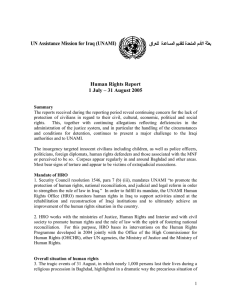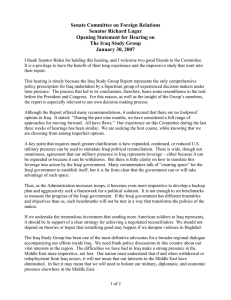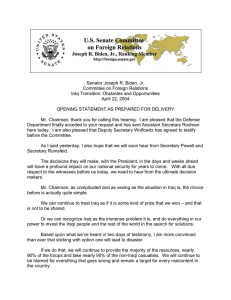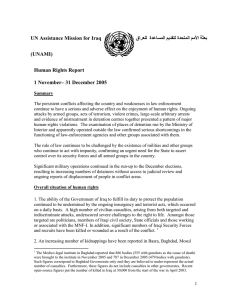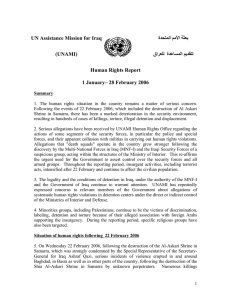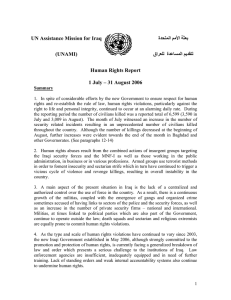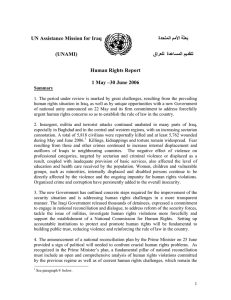Document 10744405
advertisement
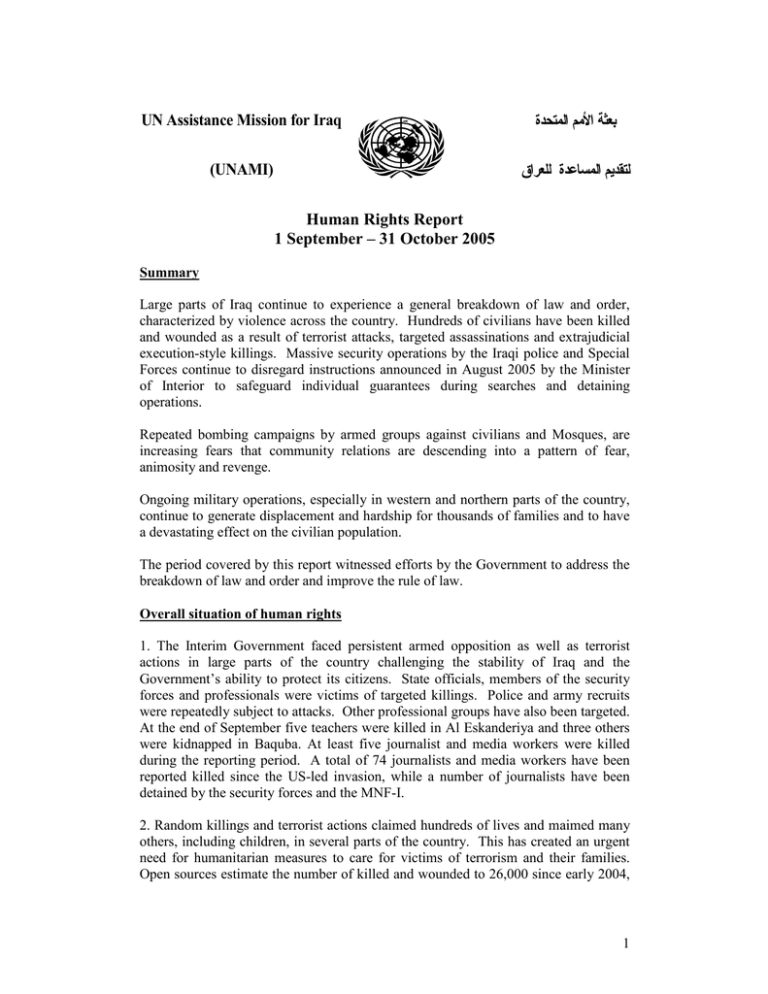
UN Assistance Mission for Iraq (UNAMI) Human Rights Report 1 September – 31 October 2005 Summary Large parts of Iraq continue to experience a general breakdown of law and order, characterized by violence across the country. Hundreds of civilians have been killed and wounded as a result of terrorist attacks, targeted assassinations and extrajudicial execution-style killings. Massive security operations by the Iraqi police and Special Forces continue to disregard instructions announced in August 2005 by the Minister of Interior to safeguard individual guarantees during searches and detaining operations. Repeated bombing campaigns by armed groups against civilians and Mosques, are increasing fears that community relations are descending into a pattern of fear, animosity and revenge. Ongoing military operations, especially in western and northern parts of the country, continue to generate displacement and hardship for thousands of families and to have a devastating effect on the civilian population. The period covered by this report witnessed efforts by the Government to address the breakdown of law and order and improve the rule of law. Overall situation of human rights 1. The Interim Government faced persistent armed opposition as well as terrorist actions in large parts of the country challenging the stability of Iraq and the Government’s ability to protect its citizens. State officials, members of the security forces and professionals were victims of targeted killings. Police and army recruits were repeatedly subject to attacks. Other professional groups have also been targeted. At the end of September five teachers were killed in Al Eskanderiya and three others were kidnapped in Baquba. At least five journalist and media workers were killed during the reporting period. A total of 74 journalists and media workers have been reported killed since the US-led invasion, while a number of journalists have been detained by the security forces and the MNF-I. 2. Random killings and terrorist actions claimed hundreds of lives and maimed many others, including children, in several parts of the country. This has created an urgent need for humanitarian measures to care for victims of terrorism and their families. Open sources estimate the number of killed and wounded to 26,000 since early 2004, 1 while other open sources estimate at over 30,000 the number of civilians killed in Iraq since March 2003. 3. The proliferation of armed militias, criminal and terrorist organizations acting with impunity constitutes a major challenge to law and order and a threat to the security of the civilian population. Militias have been accused of kidnappings, extra-judicial executions and carrying out illegal policing and sectarian attacks. It is extremely worrying that some of these crimes are committed by individuals wearing police and military uniforms and using police or military equipment. In some areas, including Baghdad, sectarian violence increasingly seems to aim at disrupting the traditionally peaceful coexistence of communities. Reports from Baghdad’s neighbourhoods of Al-Hurriya, Al-Adhamiya, Al-Amriya, Al-Khadhraa, Abu Dsheer, Baghdad Aljedeeda and Al-Dura portray ongoing violence resulting in displacement of individuals and families to other neighbourhoods following threats and killings. Similar displacements were reported to and from Basra, Baghdad, Ninewa and Al Anbar. There are also voluntary displacements, as families have shared the concern with the Human Rights Office that sectarian pressures are too intense to permit them to remain in their neighborhood. Such displacements have been reported in Tal Afar, Tarmiya, Basra and other cities in the country. There are continuous first hand reports that long term Arab residents are still victims of stigmatization, harassment and arbitrary detention because of their perceived association with “foreign fighters.” 4. Ongoing military and security operations by MNF-I and Iraqi forces with the stated aim of restoring law and order, including the resort to aerial bombardment, also had a negative impact on human rights. The United Nations has been unable to obtain accurate figures concerning civilian losses following such operations but reports received from civil society organizations, medical sources and other monitors indicate that they are significant and include women and children. According to figures released by the MNF-I and NGOs, more than 10,000 families have been displaced due to ongoing military operations in Al Anbar and Ninewa Governorates. Displaced persons’ access to basic services has been severely hampered. Similarly, the impediment of the delivery of humanitarian assistance to areas and individuals affected remains a key point of concern, as is the growing number of humanitarian actors detained or imprisoned while attempting to carry out their work. According to reports from the Word Health Organization, during military operations in Al Anbar Governorate in October, medical doctors were detained and medical facilities occupied by armed forces. The UN has repeatedly raised this issue with the Ministry of Health. Such actions are contrary to international law governing armed conflict and in any event they constitute a denial of the protection of international human rights law. Many homes have been damaged or destroyed and restrictions on freedom of movement have added to civilian hardship. The price paid by civilians, including women and children, during military activity currently underway calls for further reflection on the nature and conduct of the conflict and on the proportionality of the use of force. 5. The Human Rights Office continues to receive reports from civil society organizations and individuals regarding searches and arrests carried out by police and Special Forces that allegedly were in breach of the law. The instructions issued by the Ministry of Interior in August 2005, requesting respect of fundamental rights while conducting searches of homes, appear by and large not to be enforced. On 24 2 October, the Minister of Interior, Mr. Bayan Baqir Jabr, publicly reiterated his commitment to human rights principles. The Human Rights Office continues to exert efforts to ensure accountability within law enforcement in the course of its ongoing consultations with the Government. Detention 6. The large number of detainees held in the country remains a matter of concern. While progress in reviewing cases led to the release of hundreds, the overall number of detainees continued to increase due to mass arrests carried out during security and military operations. The vast majority of the detainee population1 are individuals interned under MNF-I jurisdiction for “imperative reasons of security.” A review mechanism composed of Iraqis and MNF-I was created in August 2004 as a way to enable exceptional procedures to be applied which are in violation of Iraqi emergency law, criminal law and international standards governing the protection of civilians under the law. According to the Ministry of Human Rights, some 200 to 250 cases were reviewed each week by this mechanism, resulting in some releases. Despite the releases, the Human Rights Ministry reported an overall increase of the number of detainees due to continuing mass arrests and detention operations. There is an urgent need to provide remedy to lengthy internment for reasons of security without adequate judicial oversight. 7. On 3 September, the Kurdish Regional Government announced the release of 50 persons who are reported to have been detained illegally mostly in Tameem and Ninewa Governorates. 8. UNAMI finds encouragement in the efforts made by the Government of Iraq, following UNAMI’s appeal to create the conditions allowing thousands of detainees, including security internees, to exercise their political rights and vote in the Constitutional Referendum. 9. The Human Rights Office remains concerned at reports from Mosul and other places that officials from the Ministry of Interior continue to hold in detention hundreds of individuals despite judicial orders for their release. The Human Rights Office is addressing this matter with the appropriate authorities. Rule of law 10. The United Nations will continue to assist the Government of Iraq in its attempts to foster a culture based on the rule of law and respect of human rights. UNAMI is encouraged by the launching of a rule of law sectoral working group by the Ministry of Planning on 18 October. The working group, which will be chaired by the Chief Justice, will coordinate all efforts by various Iraqi ministries and donors, including the United Nations, to ensure that technical assistance programmes are translated in an improved rule of law situation in the country. Civil society organizations will be also involved in this process. 1 According to the Ministry of Human Rights as of 26 October out of a total population of 23,394 detainees there were 11,559 detainees in the custody of the MNF-I; 7,577 in the custody of the Ministry of Justice, 342 juveniles under the custody of the Ministry of Labour and Social Affairs and 3,916 held by the Ministry of Interior. 3 11. On 2 September, UNAMI issued a statement expressing its regret for the reinstatement of the death penalty, urging the Government of Iraq to commute all future sentences to capital punishment and to base its legitimate quest for security on the protection and promotion of the right to life. According to a list provided by the Government of Iraq, 54 people are awaiting execution. In Erbil, two persons remain on death row while at least four others await final review by the Criminal Panel of the Supreme Court of the Kurdistan Regional Government. 12. UNAMI is concerned about the continued extension of the state of emergency across Iraq with the exception of the three Northern Governorates. Furthermore, the wide definition of “terrorism” contained in the new anti-terrorism law debated by the Transitional National Assembly, as well as the extension of the application of capital punishment to new categories of crimes, such as notions of complicity, remain a source of serious concern. 13. UNAMI maintains a constructive dialogue with representatives of the General Inspector’s Office in the Ministry of Interior, the Ministry of Human Rights, Ministry of Justice and Ministry of Defense. The Human Rights Office is encouraged by the commitment and determination of these representatives to improve human rights in Iraq. The Human Rights Office is encouraged by the commitment shown by these representatives to improve human rights in Iraq despite formidable challenges. 14. With high levels of violence and human rights violations, the Iraqi authorities need to focus on fighting widespread impunity, which if not addressed will further undermine the rule of law and peaceful coexistence. The right of victims to timely justice and redress should be central to any strategy to combat violations. Iraq would benefit from enhanced accountability systems and increased efforts to combat impunity for crimes committed by all sides of the conflict. 15. The trial of Saddam Hussein and other members of the previous regime, charged with crimes against humanity for the execution of more than 140 individuals in the town of Dujail after a failed assassination attempt against the former President, started on 19 October and was adjourned to 28 November. This is the first trial before the Supreme Iraqi Criminal Tribunal. The Human Rights Office and the UN Office of the High Commissioner for Human Rights are following the proceedings actively and closely in coordination with other organizations. A day after the trial’s adjournment a defense counsel of one of the accused was abducted and killed. Following this killing, the Iraqi Bar Association announced a one-day strike starting on 26 October. Referendum 16. The high turnout of participation to the referendum was a positive step. It is important to note the efforts of the Iraqi authorities to ensure the inclusion of as many citizens as possible in the process. As the referendum results highlighted the political polarization in Iraq the Special Representative of the Secretary General, Mr. Ashraf Qazi, noted that “it will be essential that all of Iraq’s communities fully participate in the December elections to ensure their full representation in the Government, the Council of Representatives and the Constitutional Review Commission which will be established for the express purpose of further broadening the national base of support 4 for the fundamental law of the land, i.e. the Constitution.” The high levels of voter turnout throughout the country and amongst all the main political constituencies and the security arrangements that were made contributed to the success of the event. Activities: 17. From 25-29 September in Amman, UNAMI convened and chaired a meeting of families of missing persons, the last of the preparatory meeting towards the establishment of a National Centre for Missing and Disappeared Persons. The meeting decided to establish a Transitional Committee to oversee the implementation of earlier recommendations prior to the establishment of the National Centre. On 18 October in Baghdad, the first meeting of the Transitional Committee took place to coordinate training and data management issues. 18. UNAMI is currently assisting with the establishment of a National Centre for the Rehabilitation of Victims of Torture. A memorandum of understanding is under discussion between UNAMI and the International Rehabilitation Council for Torture Victims in Denmark. The aim of this centre is to strengthen the capacity of Iraqi health and legal professionals to deliver multi-disciplinary care for victims of torture and to set-up a rehabilitation centre in Basra. 19. As part of the constitutional outreach effort of the United Nations, UNAMI Human Rights Office and UNOPS organized three trainings on issues related to constitutional protection of human rights. Training sessions took place in Erbil, Baghdad and Basra for about 60 human rights organizations from all over Iraq. Training sessions were conducted in collaboration with a number of Iraqi university professors and civil society organizations from Iraq and Jordan. The activity lasted for over three months and concluded on 22 September. 20. In order to continue the development of its work in the North of Iraq, the Human Rights Office visited Erbil from 28 August to 4 September. The delegation met with senior officials from the Kurdistan Regional Government and civil society to discuss the situation in the North of Iraq. A number of potential projects of common interest were identified. 21. The Human Rights Office acts in coordination with the Office of the High Commissioner for Human Rights. The Human Rights Office continues to work with Iraqi institutions and civil society to address the legacy of the past as well as present challenges in a spirit of fostering national reconciliation. In order to achieve these aims, it is imperative that conditions for law and order are improved and that the maximum guarantees of all human rights are maintained throughout the country. 5

